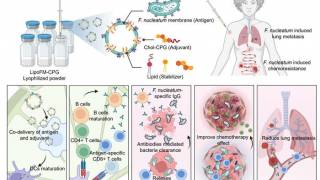Personalized Cancer Vaccine Demonstrates Long-Term Survival Benefit Among High-Risk Melanoma Patients

A Texas-based biopharmaceutical company developing personalized therapeutic cancer vaccines announced final data from a Phase IIb clinical trial.
This study evaluated adjuvant use of its personalized tumor lysate, particle-loaded, dendritic cell (TLPLDC) vaccine in patients with Stage III or Stage IV melanoma, who are at high risk of recurrence following complete surgical resection.
Elios Therapeutics stated on August 5, 2020, ‘We now have long-term data demonstrating that use of the TLPLDC vaccine for the adjuvant treatment of high-risk melanoma correlates with a 93 percent increase in patients alive at 3-years without their disease returning.’
This is an important finding since patients with later stages of the disease carry a high risk for melanoma recurrence because some melanoma cells can remain in the body, even after surgery.
The CEO, Buddy Long, continued in a press statement, "These new data, combined with the doubled rate of disease-free survival among patients treated with the vaccine and standard of care checkpoint inhibitors, further strengthen our confidence that the personalized TLPLDC vaccine provides a clinically meaningful benefit for people with high-risk melanoma.”
Historically, autologous cancer vaccines have been rather onerous to develop, sometimes taking months between the tumor biopsy and administration. Elios has simplified the process so the time from resection to injection is approximately 2-weeks.
This makes the vaccine highly feasible and will ultimately be easy for community and academic oncologists to adopt into their practices.
The TLPLDC vaccine is a personalized treatment that is created using a patient's own blood and tumor cells. Samples are collected at resection, frozen, and sent to the lab where they are used to create autologous tumor lysate, which is loaded into yeast cell wall particles.
This combination is then introduced to the patient's dendritic cells, leading to the creation of the final TLPLDC vaccine. The time from resection to injection of the vaccine takes approximately three weeks.
The vaccine has been studied in a large randomized Phase IIb trial, and the newly reported data is from the pre-specified 36-month disease-free survival (DFS) and overall survival (OS) assessment by vaccine formulation, stage, and checkpoint inhibition. The analysis included all randomized patients in an intent-to-treat (ITT) analysis.
Two versions of the vaccine, one produced by isolating dendritic cells (DCs) from 120 mL of blood (vaccine-A) and one with DCs isolated after a single injection of filgrastim followed by 50-70 mL of blood (vaccine-B), were tested in 144 participants who were randomized to receive either version of the vaccine or placebo to prevent a recurrence.
A key finding showed that treatment with vaccine-B resulted in clinical outcomes similar to placebo. Producing the vaccine with filgrastim was intended to increase white blood cell and dendritic cell counts, requiring less blood to be drawn from patients to create the vaccine.
While the use of filgrastim increased DC production, it takes only 72-hours to create the vaccine which was not enough time for the DCs to mature, rendering vaccine-B ineffective.
Importantly, vaccine-A, when compared to vaccine-B and placebo, resulted in a statistically significant improvement in 36-month DFS (51.8% vs. 23.4% vs 27.1%, respectively; p=0.027) and OS (92.9% vs. 62.8% vs 70.3%, respectively; p=0.022) in the ITT population.
Furthermore, the DFS improvement with vaccine-A was seen across both Stage III (49.7% vs. 29.4%; p=0.066) and IV (68.6% vs. 9.4%; p=0.0582) patients. Importantly, the addition of vaccine-A to current standard of care checkpoint inhibitors led to a statistically significant increase in 36-month DFS in the ITT population compared to treatment with checkpoint inhibitors alone (48.5% vs. 24.1%; p=0.039).
As previously reported, treatment with the vaccine was well-tolerated with 34.7 percent of patients experiencing a treatment-related adverse event, and >90% being grades 1 or 2.
"To demonstrate a long-term survival benefit with low toxicity in a therapeutic is what we hope for in every clinical trial. Achieving this with an aggressive disease like melanoma offers great promise for patients," said Mark B. Faries, M.D., co-director of the Melanoma Program and head of Surgical Oncology at Cedars-Sinai at The Angeles Clinic and Research Institute, and principal investigator of the study.
"With data showing a 2-fold increase in disease-free survival with the vaccine alone and in combination with checkpoint inhibitors, we hope to one day change the narrative for people with melanoma - turning this disease into a chronic condition that can be treated and managed over time."
In the U.S, the incidence of melanoma has increased over the past decades, with 91,270 estimated new cases and 9,320 related deaths in 2018.
Melanoma is more likely to grow and spread than other types of skin cancer. When diagnosed and treated at an early stage, melanoma has a high cure rate.
The TLPLDC vaccine is currently being studied as a monotherapy and in combination with standard-of-care checkpoint inhibitor therapies in a Phase IIb clinical trial for the treatment of late-stage melanoma at leading academic cancer centers in the USA.
Elios Therapeutics, LLC, a wholly-owned subsidiary of Perseus Holdings, LLC., is a biopharmaceutical company.
Vax-Before-Cancer publishes melanoma vaccine research news.
Our Trust Standards: Medical Advisory Committee
























